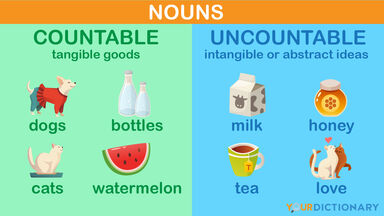
English idioms are expressions that have a figurative meaning different from their literal meaning. They are used in everyday conversations and can be challenging to understand for non-native speakers. In this lesson, we will discuss the most common English idioms and phrases with examples to help you understand their meanings better.
- Teacher: Amel MEHADJI

Nouns can be countable or uncountable. Countable nouns can be counted, e.g. an apple, two apples, three apples, etc. Uncountable nouns cannot be counted, e.g. air, rice, water, etc. When you learn a new noun, you should check if it is countable or uncountable and note how it is used in a sentence.
- Teacher: Amel MEHADJI

When it comes to the differences in British English and American English spellings even brits get caught out occasionally. The main difference is that British English keeps the spelling of words it has absorbed from other languages, mainly French and German. Whilst American English spellings are based mostly on how the word sounds when it is spoken.
English was introduced to what is modern day America in the 17th century by the British settlers. Since then the language has evolved and has been influenced by the many waves of immigration to the USA.
- Teacher: Amel MEHADJI

There is a commonly held misconception that eating disorders are a lifestyle choice. Eating disorders are actually serious and often fatal illnesses that are associated with severe disturbances in people’s eating behaviors and related thoughts and emotions. Preoccupation with food, body weight, and shape may also signal an eating disorder. Common eating disorders include anorexia nervosa, bulimia nervosa, and binge-eating disorder.
- Teacher: Amel MEHADJI
